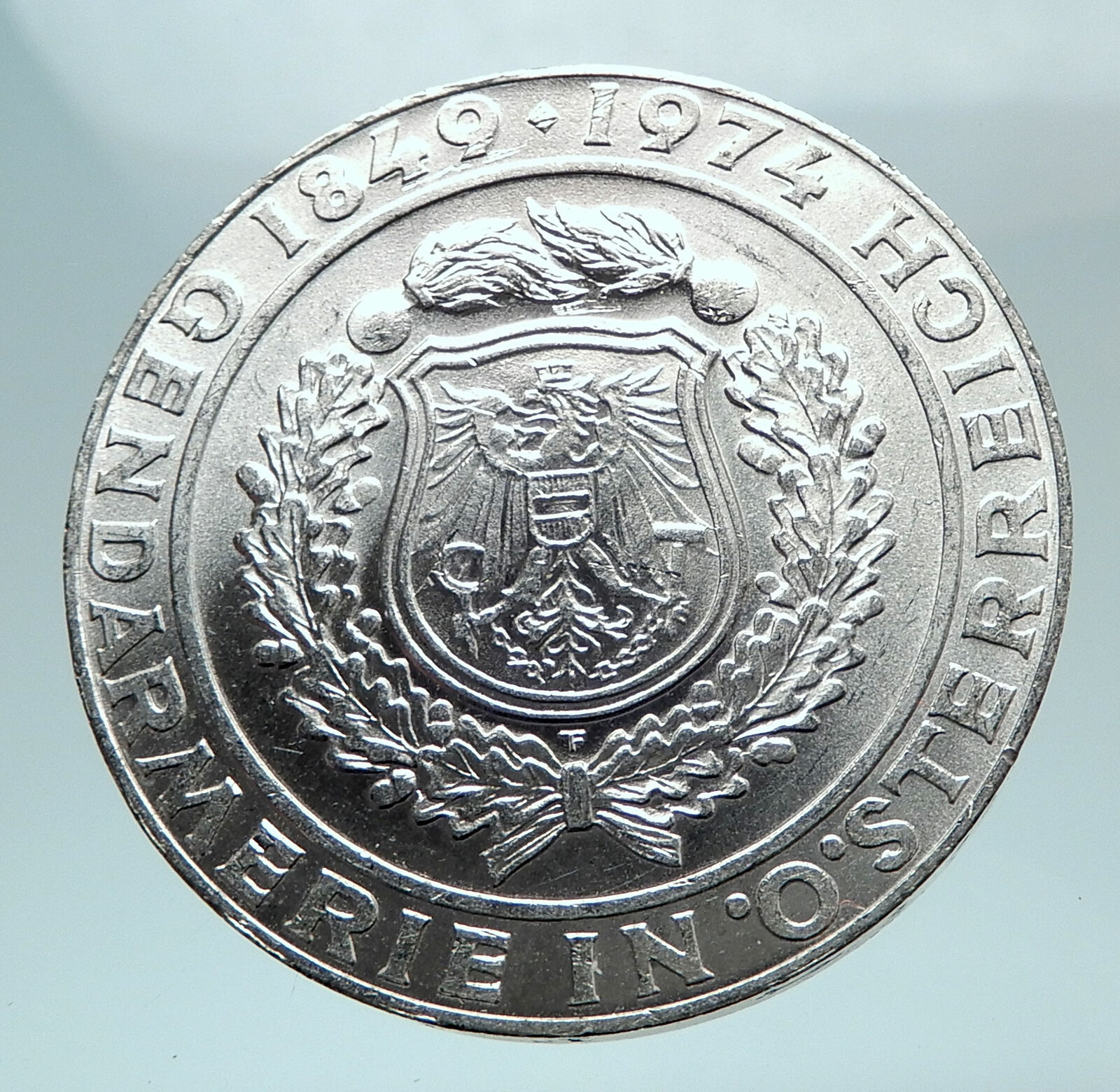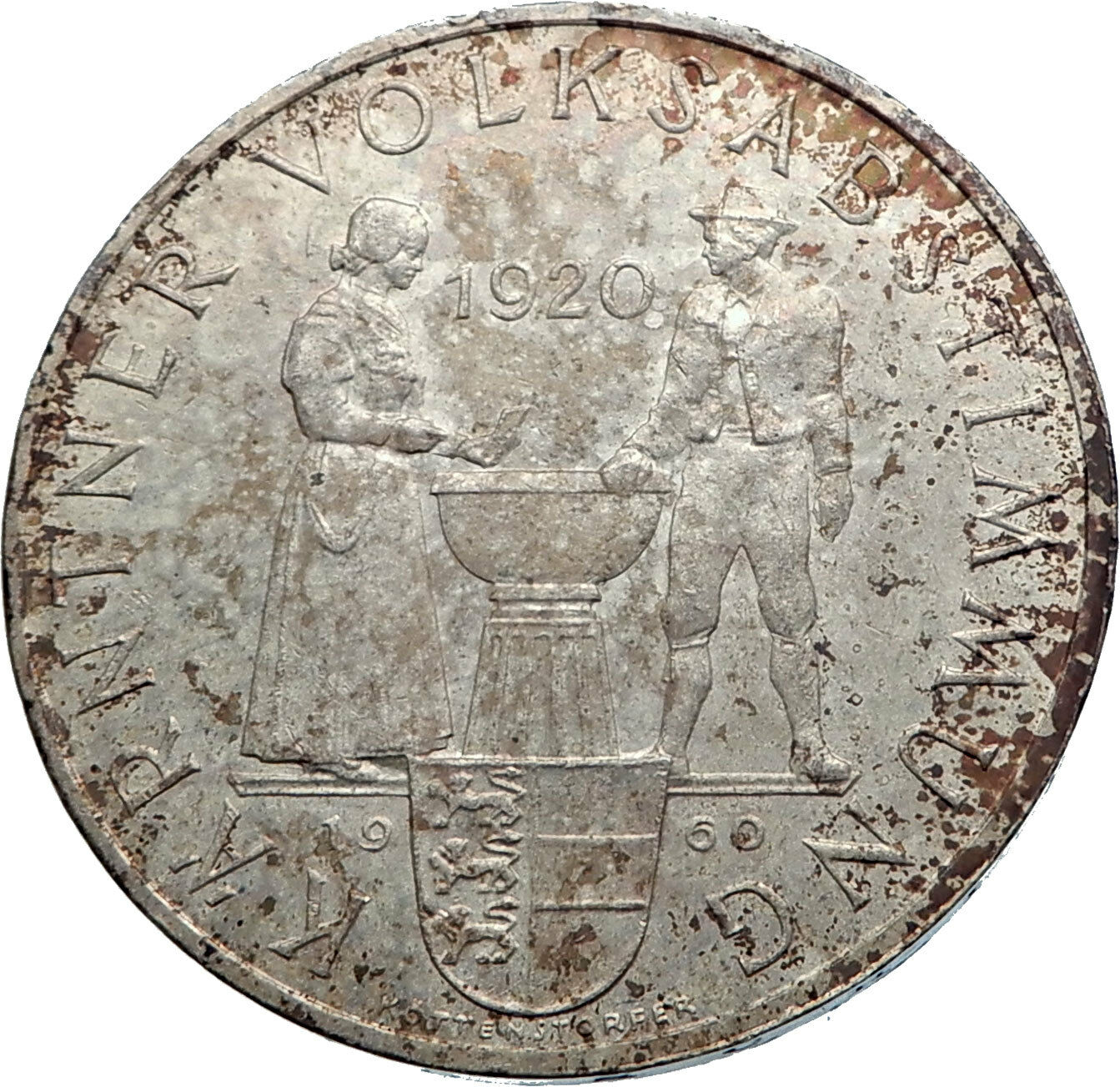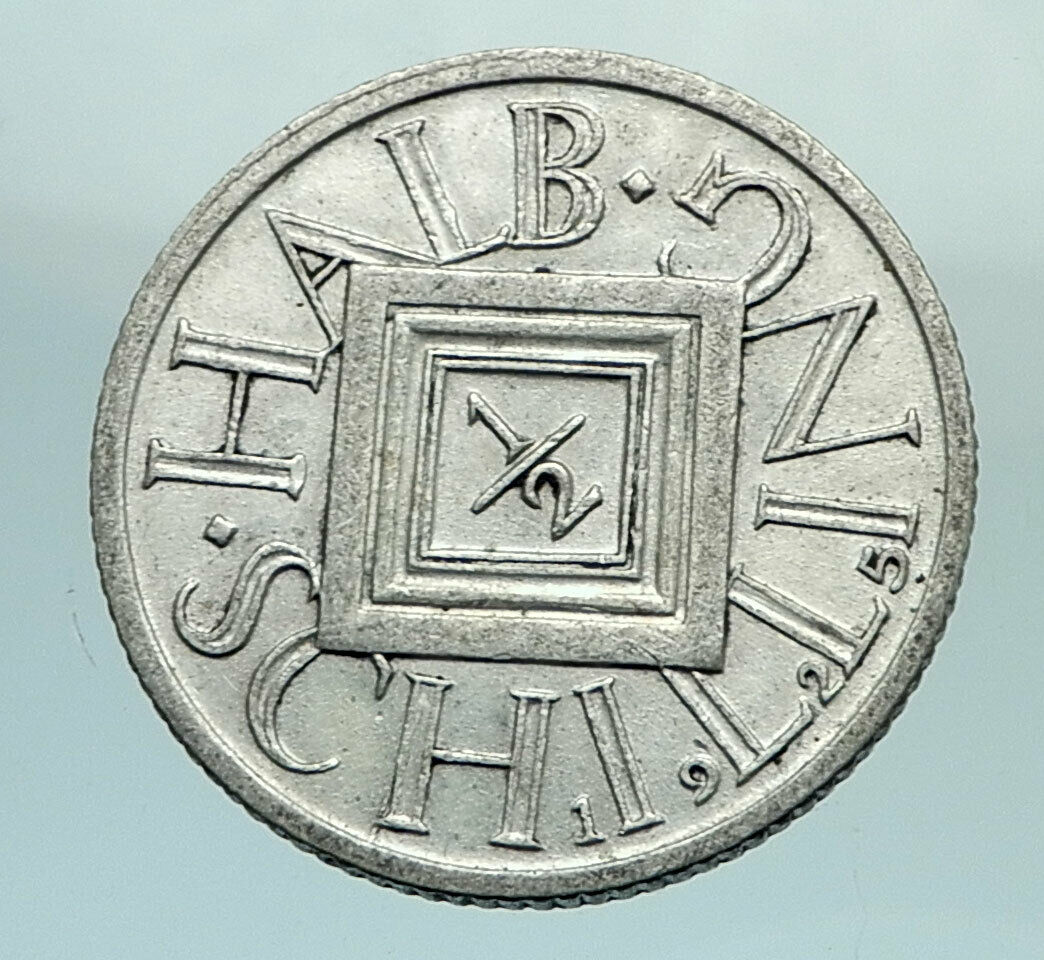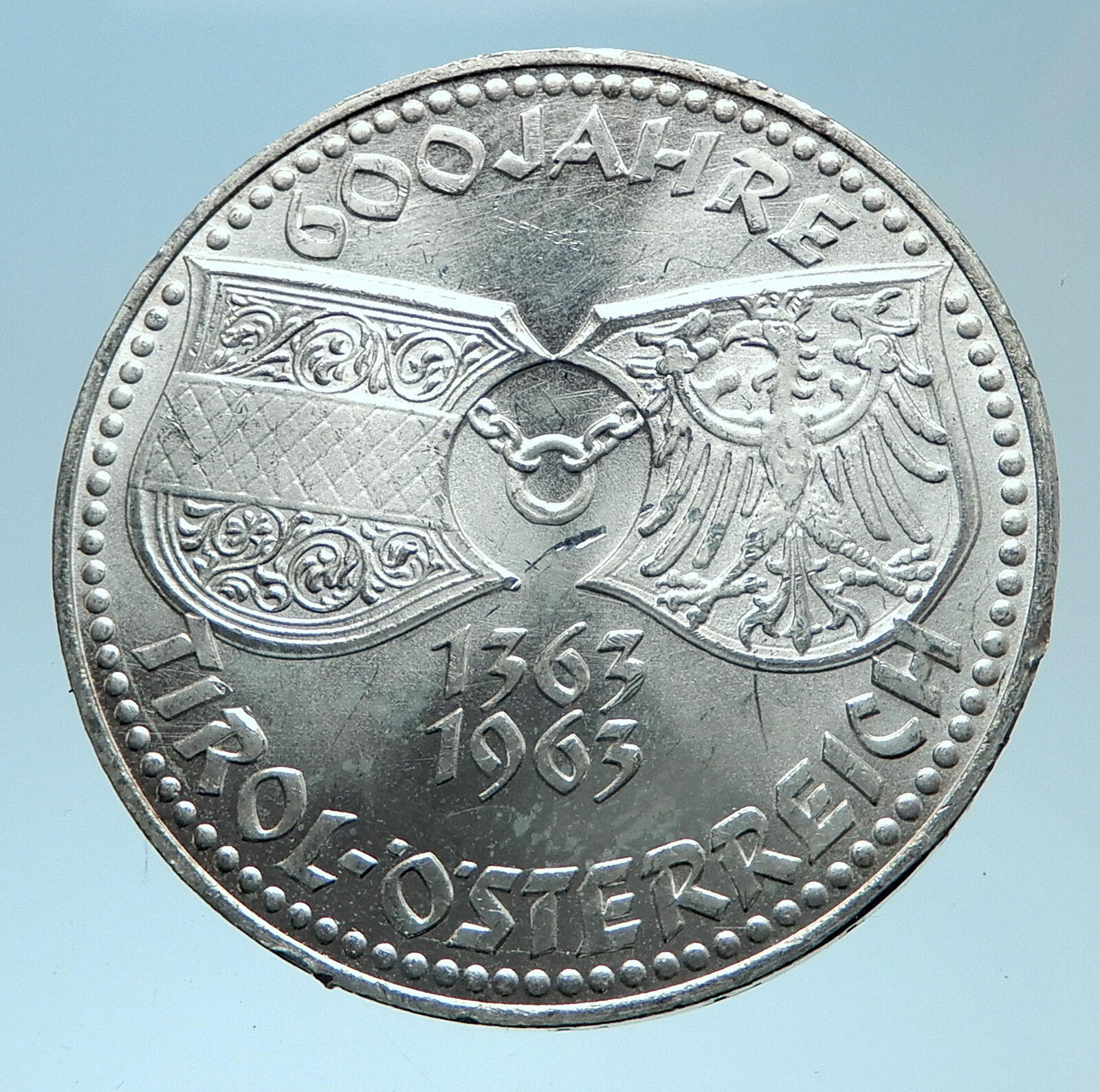|
Austria
100th Anniversary of the Death of Archduke Johann
1959 25 Schilling 30mm (12.90 grams) 0.800 Silver (0.3344 oz. ASW)
Reference: KM# 2887 Engraver: Michael Norz
REPUBLIK ÖSTERREICH 25 SCHILLING, Dragon within 3/4 circle of shields, and a larger Austrian shield to the lower left.
ERZHERZOG JOHANN 1782-1859 1959 NORZ, The collared head of Archduke Johann, a military leader in the French wars, facing right with the collar dividing date.
Edge Lettering:
FUENF UND ZWANZIG SCHILLING ***
Click here to see all coins of Austria available for sale.
You are bidding on the exact item pictured, provided with a Certificate of Authenticity and Lifetime Guarantee of Authenticity.
 Archduke John of Austria (German: Erzherzog Johann Baptist Joseph Fabian Sebastian von Österreich; 20 January 1782 – 11 May 1859), a member of the House of Habsburg-Lorraine, was an Austrian field marshal and imperial regent (Reichsverweser) of the short-lived German Empire during the Revolutions of 1848. Even though the Archduke John did not consider himself a liberal, he promoted some liberal ideas. He was often in conflict with the rigid Habsburg court, especially because of his morganatic marriage, though he would never espouse rebellion. He had earned great recognition in the Styrian lands and, moreover, he gained general acceptance by his jovial manners and his marriage with a middle-class woman. The remarks he had reputedly made in favor of German unification at the banquet in 1842, added to circulating rumors that the Archduke was a man of political liberalism, even though he was kept very far from politics by the Court. Archduke John of Austria (German: Erzherzog Johann Baptist Joseph Fabian Sebastian von Österreich; 20 January 1782 – 11 May 1859), a member of the House of Habsburg-Lorraine, was an Austrian field marshal and imperial regent (Reichsverweser) of the short-lived German Empire during the Revolutions of 1848. Even though the Archduke John did not consider himself a liberal, he promoted some liberal ideas. He was often in conflict with the rigid Habsburg court, especially because of his morganatic marriage, though he would never espouse rebellion. He had earned great recognition in the Styrian lands and, moreover, he gained general acceptance by his jovial manners and his marriage with a middle-class woman. The remarks he had reputedly made in favor of German unification at the banquet in 1842, added to circulating rumors that the Archduke was a man of political liberalism, even though he was kept very far from politics by the Court.
Head of the Austrian Government
Rioting in the streets of Vienna caused the Imperial household to flee to Innsbruck on 17 May 1848. Based on his reputation among the masses as a liberal and his personal character as a loyal prince of the reigning House, Archduke John was appointed on 16 June to be an effective viceroy in the absence of the Emperor. He was to both open the Constituent Diet and conduct the normal business of the government. By a proclamation dated 25 June and written entirely by himself, the Archduke assumed his responsibilities and set the date to open the Diet for 22 July 1848.
After he accepted the office of Regent of Germany on 5 July 1848 (see below), John maintained that he could not undertake his responsibilities in Frankfurt until he had fulfilled his responsibilities in Vienna. Therefore, he set out for Frankfurt on 8 July, the same day that the Austrian Ministry led by Baron Franz von Pillersdorf fell. After being appointed Regent in Frankfurt, he returned to Vienna on 17 July, and solemnly opened the Diet on 22 July as the Emperor’s representative. Shortly thereafter, the Archduke resigned his official duties and departed for Frankfurt. This caused the Diet to petition for the Emperor’s return to Vienna, and he did so on 12 August.
Upon the March Revolution of 1848, the Frankfurt Parliament discussed the appointment of an all-German government replacing the Federal Convention. On a proposal by the liberal politician Heinrich von Gagern, the assembly on 28 June 1848 voted for the establishment of a central authority (Provisorische Zentralgewalt) and on the next day a broad majority elected Archduke John regent of the realm (Reichsverweser).
Archduke John accepted the nomination as head of the short-lived German Empire on 5 July 1848, and on 12 July the delegates of the Federal Convention, in response to public pressure, ceded their powers to him. On July 15, the day he left for Vienna, the Regent appointed the ministers Anton von Schmerling, Johann Gustav Heckscher and Eduard von Peucker to office, completed by Prince Carl of Leiningen as minister president and head of government. Nevertheless, his political office did not offer many opportunities, though all laws had to be signed by him.
On 16 July 1848, War Minister von Peucker issued an order to all German Federal Army soldiers that, on 6 August 1848, they were to parade in honor of the Regent as the supreme commander of the Army in Germany. Upon his arrival in Vienna, the Archduke was greeted by Austrian War Minister Latour, who was quite upset with the interference of the provisional government in Austrian Army affairs. The whole Austrian Ministerial Council demanded action, and, as a result, the Archduke was forced to dispatch a formal complaint as Viceroy of Austria to himself as Regent of Germany.
First attempts by the government to obtain supreme command of the German Federal Army faced entrenched resistance from the member states. To strengthen support, the left-wing politician Robert von Mohl joined the Leiningen Cabinet on 9 August. Leiningen himself resigned on 6 September, after the Frankfurt assembly rejected to ratify the armistice of Malmö, signed by Prussia during the First Schleswig War. Minister Anton von Schmerling acted as head of government, until from November 1848 the cabinet gradually lost the support of the centrist Casino faction and finally its majority in parliament. Schmerling was forced to resign and on 17 December, Archduke John had to appoint Heinrich von Gagern new minister president, though he opposed his ‘Lesser German’ ideas.
By the terms of his Regency, Archduke John was forbidden to take part in the drafting of the Frankfurt Constitution, which was adopted on 28 March 1849 after lengthy negotiations led by Gagern. He pronounced against the strong position of Prussia and was determined to resign, but he was once more turned over by appeals from National Assembly President Eduard von Simson. When, in April 1849, King Frederick William IV of Prussia disappointed Gagern’s hopes and openly rejected the Constitution, Archduke John remained passive and reminded his Prime Minister of the terms of his service as Regent, forbidding his interference in the process. Prime Minister Gagern handed in his resignation on 10 May.
Prussia exerted pressure on the Regent to vacate the office that he had resigned, but the Archduke insisted that he would remain out of a sense of obligation, and had powerful backing from Austria’s Prime Minister, Prince Schwarzenberg, who was eager to stifle Prussian ambitions in Germany. Nevertheless, he departed for a prolonged stay at the health resort of Bad Gastein. At this point, the National Assembly was reduced to a rump parliament led by radicals and in opposition to the Regent. The Regency existed in name only, though the Archduke continued formal correspondence with Vienna and Berlin as such. He finally was allowed to resign from his office on 20 December 1849. When Archduke John came back to Frankfurt on a visit in 1858, he openly regretted the failure of the German unification.
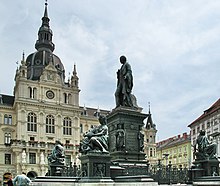 After nearly two years absence, the Archduke returned to Stainz, where he was elected the town’s first mayor on 23 July 1850. This was the first and only case in Austria where a member of the Imperial family was elected mayor of a small market town. He exercised this office until 1858, represented in his occasional absence by market judge Georg Ensbrunner. After nearly two years absence, the Archduke returned to Stainz, where he was elected the town’s first mayor on 23 July 1850. This was the first and only case in Austria where a member of the Imperial family was elected mayor of a small market town. He exercised this office until 1858, represented in his occasional absence by market judge Georg Ensbrunner.
Archduke John died in 1859 in Graz, where a fountain erected in his honor dominates the central square. He is buried in Schenna near Meran. He was the great-grandfather of noted conductor Nikolaus Harnoncourt (1929–2016).
![Location of Austria (dark green)– in Europe (green & dark grey)– in the European Union (green) – [Legend]](https://upload.wikimedia.org/wikipedia/commons/thumb/9/9d/EU-Austria.svg/250px-EU-Austria.svg.png)  Austria, officially the Republic of Austria (German: Republik Österreich), is a federal republic and a landlocked country of over 8.5 million people in Central Europe . It is bordered by the Czech Republic and Germany to the north, Hungary and Slovakia to the east, Slovenia and Italy to the south, and Switzerland and Liechtenstein to the west. The territory of Austria covers 83,879 square kilometres (32,386 sq mi). Austria’s terrain is highly mountainous, lying within the Alps; only 32% of the country is below 500 metres (1,640 ft), and its highest point is 3,798 metres (12,461 ft). The majority of the population speak local Bavarian dialects of German as their native language, and Austrian German in its standard form is the country’s official language . Other local official languages are Hungarian , Burgenland Croatian , and Slovene . Austria, officially the Republic of Austria (German: Republik Österreich), is a federal republic and a landlocked country of over 8.5 million people in Central Europe . It is bordered by the Czech Republic and Germany to the north, Hungary and Slovakia to the east, Slovenia and Italy to the south, and Switzerland and Liechtenstein to the west. The territory of Austria covers 83,879 square kilometres (32,386 sq mi). Austria’s terrain is highly mountainous, lying within the Alps; only 32% of the country is below 500 metres (1,640 ft), and its highest point is 3,798 metres (12,461 ft). The majority of the population speak local Bavarian dialects of German as their native language, and Austrian German in its standard form is the country’s official language . Other local official languages are Hungarian , Burgenland Croatian , and Slovene .
The origins of modern-day Austria date back to the time of the Habsburg dynasty when the vast majority of the country was a part of the Holy Roman Empire . From the time of the Reformation , many Northern German princes, resenting the authority of the Emperor, used Protestantism as a flag of rebellion. The Thirty Years War , the influence of the Kingdom of Sweden and Kingdom of France , the rise of the Kingdom of Prussia , and the Napoleonic invasions all weakened the power of the Emperor in the North of Germany, but in the South, and in non-German areas of the Empire, the Emperor and Catholicism maintained control. During the 17th and 18th centuries, Austria was able to retain its position as one of the great powers of Europe and, in response to the coronation of Napoleon as the Emperor of the French , the Austrian Empire was officially proclaimed in 1804. Following Napoleon’s defeat, Prussia emerged as Austria’s chief competitor for rule of a larger Germany. Austria’s defeat by Prussia at the Battle of Königgrätz , during the Austro-Prussian War of 1866 cleared the way for Prussia to assert control over the rest of Germany. In 1867, the empire was reformed into Austria-Hungary . After the defeat of France in the 1870 Franco-Prussian War , Austria was left out of the formation of a new German Empire , although in the following decades its politics, and its foreign policy, increasingly converged with those of the Prussian-led Empire. During the 1914 July Crisis that followed the assassination of Archduke Franz Ferdinand of Austria , Germany guided Austria in issuing the ultimatum to Serbia that led to the declaration of World War I .
After the collapse of the Habsburg (Austro-Hungarian) Empire in 1918 at the end of World War I, Austria adopted and used the name the Republic of German-Austria (Deutschösterreich, later Österreich) in an attempt for union with Germany , but was forbidden due to the Treaty of Saint-Germain-en-Laye (1919) . The First Austrian Republic was established in 1919. In the 1938 Anschluss , Austria was occupied and annexed by Nazi Germany .[14] This lasted until the end of World War II in 1945, after which Germany was occupied by the Allies and Austria’s former democratic constitution was restored. In 1955, the Austrian State Treaty re-established Austria as a sovereign state, ending the occupation. In the same year, the Austrian Parliament created the Declaration of Neutrality which declared that the Second Austrian Republic would become permanently neutral .
Today, Austria is a parliamentary representative democracy comprising nine federal states . The capital and largest city, with a population exceeding 1.7 million, is Vienna . Austria is one of the richest countries in the world , with a nominal per capita GDP of $52,216 (2014 est.). The country has developed a high standard of living and in 2014 was ranked 21st in the world for its Human Development Index . Austria has been a member of the United Nations since 1955, joined the European Union in 1995, and is a founder of the OECD . Austria also signed the Schengen Agreement in 1995, and adopted the euro in 1999.
|





 Archduke John of Austria (German: Erzherzog Johann Baptist Joseph Fabian Sebastian von Österreich; 20 January 1782 – 11 May 1859), a member of the House of Habsburg-Lorraine, was an Austrian field marshal and imperial regent (Reichsverweser) of the short-lived German Empire during the Revolutions of 1848. Even though the Archduke John did not consider himself a liberal, he promoted some liberal ideas. He was often in conflict with the rigid Habsburg court, especially because of his morganatic marriage, though he would never espouse rebellion. He had earned great recognition in the Styrian lands and, moreover, he gained general acceptance by his jovial manners and his marriage with a middle-class woman. The remarks he had reputedly made in favor of German unification at the banquet in 1842, added to circulating rumors that the Archduke was a man of political liberalism, even though he was kept very far from politics by the Court.
Archduke John of Austria (German: Erzherzog Johann Baptist Joseph Fabian Sebastian von Österreich; 20 January 1782 – 11 May 1859), a member of the House of Habsburg-Lorraine, was an Austrian field marshal and imperial regent (Reichsverweser) of the short-lived German Empire during the Revolutions of 1848. Even though the Archduke John did not consider himself a liberal, he promoted some liberal ideas. He was often in conflict with the rigid Habsburg court, especially because of his morganatic marriage, though he would never espouse rebellion. He had earned great recognition in the Styrian lands and, moreover, he gained general acceptance by his jovial manners and his marriage with a middle-class woman. The remarks he had reputedly made in favor of German unification at the banquet in 1842, added to circulating rumors that the Archduke was a man of political liberalism, even though he was kept very far from politics by the Court. After nearly two years absence, the Archduke returned to Stainz, where he was elected the town’s first mayor on 23 July 1850. This was the first and only case in Austria where a member of the Imperial family was elected mayor of a small market town. He exercised this office until 1858, represented in his occasional absence by market judge Georg Ensbrunner.
After nearly two years absence, the Archduke returned to Stainz, where he was elected the town’s first mayor on 23 July 1850. This was the first and only case in Austria where a member of the Imperial family was elected mayor of a small market town. He exercised this office until 1858, represented in his occasional absence by market judge Georg Ensbrunner.![Location of Austria (dark green)– in Europe (green & dark grey)– in the European Union (green) – [Legend]](https://upload.wikimedia.org/wikipedia/commons/thumb/9/9d/EU-Austria.svg/250px-EU-Austria.svg.png)
 Austria, officially the Republic of Austria (German:
Austria, officially the Republic of Austria (German: 
